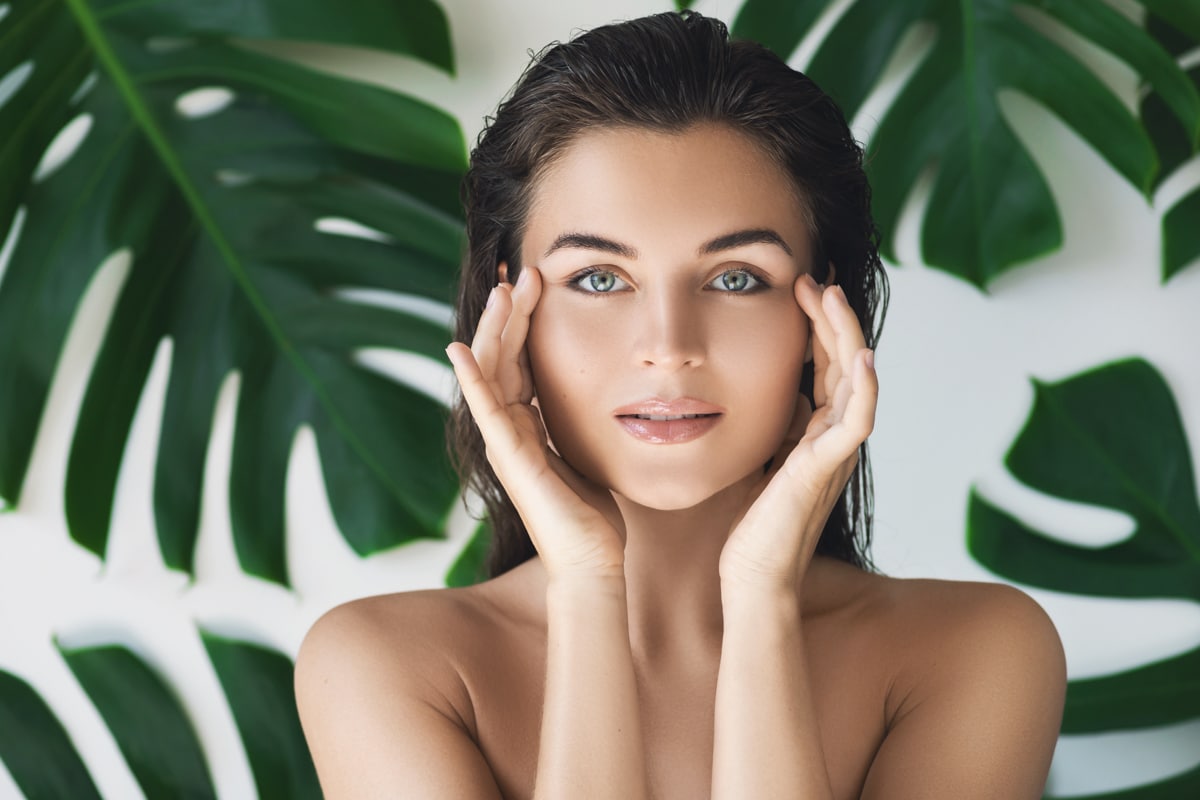Key Points
-
Effective skincare is worth the time, effort, and investment.
-
The trick to good skincare is knowing which ingredients provide a worthwhile return on investment.
-
This article discusses five skincare ingredients that are worth their weight in gold.
-
Adding one or more of these substances to your regular skincare routine will positively impact the health and look of your skin.
Does walking the skincare aisle at your favorite beauty store or navigating the skincare pages of your preferred online retailer set your head spinning with ingredients and product choices? If so, this article's here to put you at ease. Welcome to your comprehensive guide to the top five innovative anti-aging ingredients to look for in skincare products. Use this research-backed, up-to-date information to keep your skin looking youthful and radiant.
Alpha Hydroxy Acids (AHAs)
Alpha Hydroxy Acids, or AHAs, are water-soluble acids derived from fruits and milk. The most common forms of AHAs include glycolic acid, lactic acid, and malic acid. Their benefits include gentle exfoliation of the skin, promotion of collagen production, diminishment of fine lines and wrinkles, and improvement of skin texture. AHAs slough off dead skin cells and reveal a smoother, more evenly-toned complexion.
AHAs work by breaking the bonds between skin cells, encouraging cell turnover, and revealing new, healthy skin. This process addresses common signs of aging such as fine lines, wrinkles, and uneven pigmentation. By promoting collagen production, AHAs also improve skin elasticity and firmness, thus reducing sagging and the loss of volume associated with aging skin.
For optimal results, choose the appropriate AHA concentration and pH level according to your skin type and sensitivity. Using AHAs increases your skin's sun sensitivity, so adequate sun protection is a must when incorporating an AHA into your skincare routine. Start with a low concentration and slowly increase to minimize potential irritation and ensure a smooth, youthful appearance.
Lactic Acid: An AHA for Sensitive Types
Shani Darden is one of the most popular facialists in Hollywood. She's also creator and owner of an eponymous line of skincare products. Lactic acid, she says, is one of the most common AHAs she recommends to clients because it's the gentlest option. She told Harper's Bazaar, "The lactic acid molecule is larger than other AHAs like glycolic acid, or the beta hydroxy acid (BHA) salicylic acid. A larger molecule means that it cannot penetrate the skin as deeply, so you're getting more surface treatment — think exfoliating and, ergo, brightening."
Niacinamide
Niacinamide, also known as vitamin B3, is a powerful antioxidant with numerous anti-aging benefits. It improves skin elasticity, reduces the appearance of fine lines and wrinkles, and promotes a healthy skin barrier. Niacinamide's anti-inflammatory properties also make it an excellent option for those with acne-prone or sensitive skin.
Niacinamide not only aids in anti-aging but also addresses other skin concerns such as hyperpigmentation, redness, and blemishes. By inhibiting the transfer of melanin, it reduces dark spots and evens out skin tone. Its ability to boost ceramide production fortifies the skin's natural barrier, thus improving moisture retention and reducing sensitivity to external irritants.
Most users can safely incorporate niacinamide into their skincare routine. Mild stinging or redness may occur with higher concentrations, but these symptoms typically subside as your skin acclimates to the ingredient. Look for products containing a concentration of 4-10 percent niacinamide for optimal efficacy. Keep in mind that niacinamide can be combined with other anti-aging ingredients such as AHAs and retinol to further bolster your routine.
Peptides
Peptides are short chains of amino acids and the building blocks of proteins such as collagen, elastin, and keratin that comprise your skin. They act as messengers, signaling your skin to produce more collagen, leading to improved skin elasticity and reduced signs of aging. Peptides are great for all skin types and offer diverse benefits, from smoothing wrinkles to brightening the skin.
Numerous types of peptides exist, each with its unique function in anti-aging skincare. Signal peptides promote collagen production, while enzyme-inhibitor peptides slow down the degradation of collagen. Carrier peptides deliver essential trace elements such as copper, which aids in skin regeneration and wound healing. Some well-known anti-aging peptides include matrixyl, copper peptides, and argireline.
Incorporate peptides into your skincare routine through serums, creams, and even some facial cleansers. Look for products that house peptides in opaque, airless containers to preserve potency. Additionally, ensure that your chosen product contains other supportive ingredients such as antioxidants and emollients to maximize effectiveness in battling the signs of aging.
Ancient Antimicrobial Protection? There's a Peptide for That
There are many peptide types with many different functions. These building blocks of protein have been around as long as life itself. In August 2023, scientists at the University of Pennsylvania announced research that uncovered ancient peptides from Neanderthal and Denisovan samples that show pronounced antimicrobial activity. Translation: These peptides could potentially be the basis of future antibiotic medicines.
Neanderthals and Denisovans are the two closest biological relatives of modern Homo sapiens. If you're familiar with what Neanderthals and Denisovans looked like, you know they weren't skincare pioneers. Still, it's fascinating to think that the same type of short-chain amino acid that's crucial to effective modern skincare has been around so long and that, even in ancient form, it can play a role in helping create medicines to address modern disease. While humanity may never get a peptide-rich, Neanderthal-derived beauty cream, it may well get a peptide-based, Neanderthal-derived antibiotic.
Resveratrol
Resveratrol is a potent antioxidant found in the skins of grapes, red wine, and berries. It has gained popularity in skincare due to its ability to neutralize damaging free radicals and combat oxidative stress, thus reducing signs of aging. In addition to its antioxidant properties, resveratrol boasts anti-inflammatory, anti-microbial, and even cancer-fighting benefits, making it an all-around powerhouse ingredient.
Research shows that resveratrol effectively helps slow down the aging process by protecting the skin against environmental aggressors such as UV radiation and pollution. It also stimulates collagen production and reduces inflammation, leading to a smoother and more resilient complexion. Look for products containing resveratrol alongside other beneficial ingredients such as peptides, ceramides, and hyaluronic acid. Combining such potent, complementary ingredients with resveratrol creates powerful synergies for your skin's health and appearance.
Resveratrol is generally well-tolerated, making it suitable for most skin types. However, always perform a patch test before incorporating a new ingredient into your routine. To make the most of resveratrol's benefits, opt for serums or creams with a stable formula and air-tight packaging. You can use these products both morning and evening, but pair them with an effective sunscreen during the day to maximize protective effects.
Retinol
Retinol (vitamin A) is arguably the gold standard ingredient for anti-aging. It accelerates skin cell turnover, stimulates collagen production, and suppresses excessive melanin synthesis. These actions collectively improve skin texture, reduce fine lines and wrinkles, and even out the complexion. Retinol's ability to regulate sebum production also makes it an effective treatment for acne-prone skin.
Navigating the world of retinol products can be overwhelming due to the diverse forms and concentrations. It's crucial to ease into using retinol, especially for sensitive or inexperienced users. Start with a low concentration (0.1-0.3 percent). It's also essential to look for retinol products that contain soothing ingredients such as hyaluronic acid and niacinamide to balance potential irritation.
While using retinol, always be mindful of safe practices. Apply sunscreen daily, as retinol increases your skin's sun sensitivity. Begin by using retinol products every other day, gradually increasing the frequency to nightly usage. Contrary to popular belief, retinol can be safely used in combination with many other anti-aging ingredients, such as niacinamide, AHAs, and peptides, as long as they're introduced gradually into your routine.
Fortify Your Anti-Aging Arsenal
Now you have five potent, innovative anti-aging ingredients to add to your anti-aging arsenal. Choose your preferred ingredients carefully using the information here to make better informed skincare decisions. With one or more of these ingredients at your disposal, you can effectively fight off the signs of aging and maintain a vibrant, youthful complexion. Remember to consult a skincare professional before using new products, and never forget that consistency and patience are key when it comes to achieving visible results.
For regular tips and insights into anti-aging products and routines, subscribe to Age Defying now!




